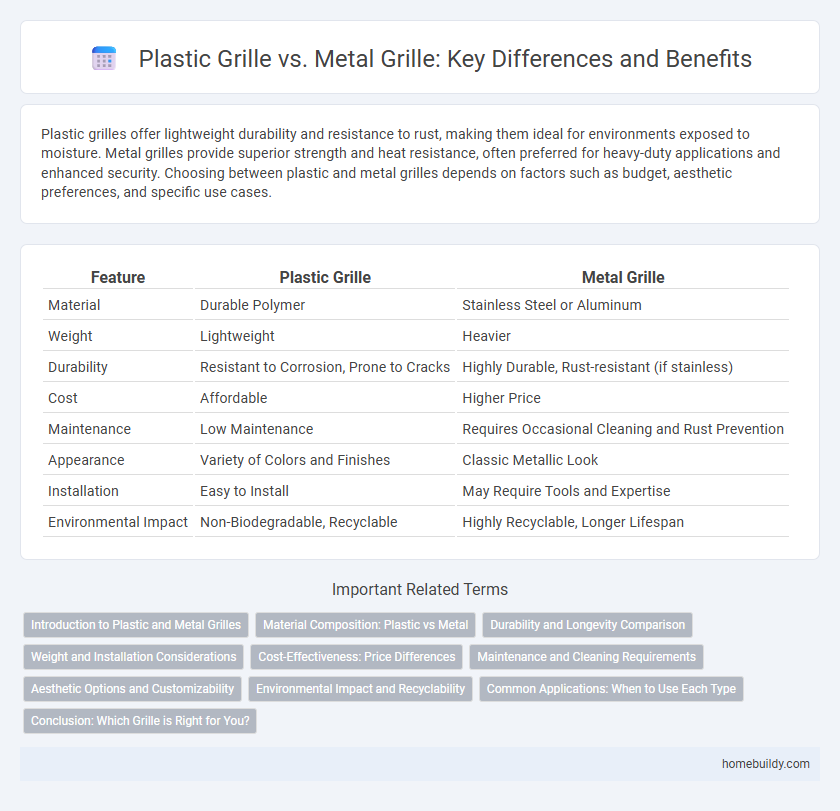Plastic grilles offer lightweight durability and resistance to rust, making them ideal for environments exposed to moisture. Metal grilles provide superior strength and heat resistance, often preferred for heavy-duty applications and enhanced security. Choosing between plastic and metal grilles depends on factors such as budget, aesthetic preferences, and specific use cases.
Table of Comparison
| Feature | Plastic Grille | Metal Grille |
|---|---|---|
| Material | Durable Polymer | Stainless Steel or Aluminum |
| Weight | Lightweight | Heavier |
| Durability | Resistant to Corrosion, Prone to Cracks | Highly Durable, Rust-resistant (if stainless) |
| Cost | Affordable | Higher Price |
| Maintenance | Low Maintenance | Requires Occasional Cleaning and Rust Prevention |
| Appearance | Variety of Colors and Finishes | Classic Metallic Look |
| Installation | Easy to Install | May Require Tools and Expertise |
| Environmental Impact | Non-Biodegradable, Recyclable | Highly Recyclable, Longer Lifespan |
Introduction to Plastic and Metal Grilles
Plastic grilles offer lightweight durability and resistance to corrosion, making them ideal for applications in humid or coastal environments. Metal grilles, typically fabricated from aluminum or stainless steel, provide superior strength, heat resistance, and a sleek, modern aesthetic suited for high-traffic or industrial settings. Both materials support customizable designs and varying levels of ventilation, with plastic grilles favored for cost-effectiveness and metal grilles preferred for long-term structural integrity.
Material Composition: Plastic vs Metal
Plastic grilles are typically made from high-density polyethylene (HDPE) or polypropylene, offering lightweight flexibility, corrosion resistance, and ease of molding into intricate designs. Metal grilles, often composed of aluminum or stainless steel, provide superior strength, durability, and heat resistance, making them ideal for heavy-duty applications. While plastic grilles excel in cost-effectiveness and weather resilience, metal grilles outperform in structural integrity and long-term wear.
Durability and Longevity Comparison
Metal grilles offer superior durability and longevity compared to plastic grilles, with resistance to impact, temperature fluctuations, and UV exposure, making them ideal for harsh environments. Plastic grilles, while lightweight and corrosion-resistant, tend to degrade faster due to brittleness and discoloration over time. Choosing metal grilles ensures extended performance and structural integrity under demanding conditions.
Weight and Installation Considerations
Plastic grilles offer a significant advantage in weight, being much lighter than metal grilles, which simplifies handling and reduces strain during installation. Metal grilles, while heavier, provide greater structural strength but often require more robust mounting hardware and careful alignment to ensure secure fitting. The lighter weight of plastic grilles enables quicker installation, especially in applications where ease of handling and speed are critical.
Cost-Effectiveness: Price Differences
Plastic grilles generally offer a more cost-effective solution compared to metal grilles due to lower raw material and manufacturing expenses. Metal grilles, while more durable and resistant to environmental wear, typically come with higher initial costs and increased maintenance requirements. Choosing between plastic and metal grilles depends on budget constraints and the desired balance between upfront investment and long-term durability.
Maintenance and Cleaning Requirements
Plastic grilles require less maintenance due to their resistance to rust, corrosion, and fading, making them easier to clean with mild soap and water. Metal grilles, while more durable, often need regular cleaning to prevent rust and may require protective coatings or paint touch-ups to maintain their appearance. Choosing plastic grilles reduces the frequency and intensity of cleaning tasks, especially in humid or coastal environments.
Aesthetic Options and Customizability
Plastic grilles offer a wide range of aesthetic options, including diverse colors, finishes, and intricate designs that can easily match various architectural styles. Metal grilles provide a high level of customizability with their durability allowing for detailed patterns and textures through welding, cutting, or embossing techniques. Both materials cater to unique design preferences, but plastic excels in lightweight versatility while metal emphasizes strength and intricate craftsmanship.
Environmental Impact and Recyclability
Plastic grilles typically have a lower initial environmental footprint due to less energy-intensive production but pose challenges in recyclability because many types of plastic degrade in quality after recycling. Metal grilles, often made from aluminum or steel, require more energy to produce but are highly recyclable with minimal loss in material quality, promoting long-term sustainability. The environmental impact of metal grilles is reduced through efficient recycling processes, whereas plastic grilles often contribute to landfill waste and microplastic pollution if not properly managed.
Common Applications: When to Use Each Type
Plastic grilles are commonly used in residential settings, lightweight machinery, and automotive interiors due to their corrosion resistance and cost-effectiveness. Metal grilles are preferred in industrial facilities, heavy equipment, and outdoor architecture where strength, durability, and heat resistance are critical. Selecting the appropriate grille depends on environmental exposure, mechanical stress, and design requirements specific to the application.
Conclusion: Which Grille is Right for You?
Plastic grilles offer lightweight durability and cost-effectiveness, making them ideal for budget-conscious projects or vehicles needing corrosion resistance, while metal grilles provide superior strength and impact resistance, suitable for heavy-duty applications or high-end aesthetics. Consider environmental factors, maintenance requirements, and vehicle type when choosing between plastic and metal grilles. The right grille balances functionality, durability, and style to best match your specific needs and preferences.
Plastic Grille vs Metal Grille Infographic

 homebuildy.com
homebuildy.com